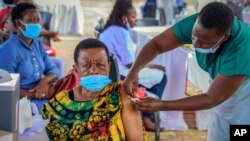Ugandans may find themselves in jail for two months if they are found breaking public health controls in a new COVID-19 law. Through July, acts such as praying in open spaces, not wearing masks, hawking, street vending and selling nonfood items will get one arrested. These are now deemed acts that enable the spread of COVID-19. Uganda has registered 1,057 new cases, 1081 active cases and 1061 deaths.
Samples collected in early June indicate that the predominant COVID strain currently in Uganda is the delta variant first seen in India.
Jane Ruth Aceng is the minister for health.
"From our observations, we have noted increased transmissibility resulting in a fast-moving outbreak, more severe clinical presentations of new cases and unfortunately resulting in poor clinical outcomes," said Aceng.
Aceng says Uganda will most likely reach the peak of daily case numbers in late July or early August, before registering a slight drop in cases.
That is why, through July, anyone found praying in an open space or outside a church or a mosque, not wearing masks, hawking, street vending and selling nonfood items will be sentenced to two months in jail.
Anyone found operating a bar or a movie theater, attending a seminar, cultural event or indoor sports event could face jail time if convicted.
State minister for health Anifa Kawooya says the law is necessary.
"These penalties are not punishments. In one way, it is to instill attitude change," said Kawooya. "That the moment that you know that if I don’t observe these SOPs [standard operating procedures], this will happen.”
The new law also prohibits entry of visitors from India, other than Ugandan citizens or residents. Anyone who aids in the escape of someone confined in a place designated for isolation or quarantine of COVID-19 can also be imprisoned for two months.
More vaccine coming
The Health Ministry hopes that once the government can acquire more vaccines, fewer people will be severely affected and in need of critical care in hospitals. So far 861,645 people have been inoculated with their first dose of AstraZeneca and 129,257 have had their second dose.
Between July and August Uganda expects to receive 974,400 doses of the AstraZeneca vaccine from the Covax facility and another 300,000 Sinovac doses from China.
To encourage Ugandans to get vaccinated, the country is currently undertaking a study to monitor vaccine efficacy by counting COVID infections that may occur in vaccinated people.
"Preliminary Investigations show that no hospitalized persons were fully vaccinated at the time of illness," said Aceng. "Therefore, there’s no current evidence to support the allegations that fully vaccinated persons have acquired severe infections and died in Uganda.”
Uganda has also applied for 2 million doses of the Johnson and Johnson vaccine through the African Export-Import Bank and the African Union. and another 9 million doses through the Covax cost-sharing facility.





